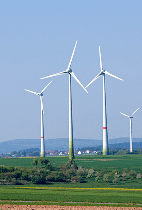Experts have suggested that if farms were to accommodate renewable energy resources, our clean energy and food-price-hike problems could be dramatically reduced.
Trade association Renewable UK, online energy community Energyshare and food business River Cottage organised a conference at the Devon / Cornwall border where the results of Nottingham Trent University Forum’s survey were discussed. The survey found that of the almost 700 farmers asked, 38% were already producing some form of renewable energy, 61% would consider investing in renewable energy in the next 5 years and 76% felt that the potential for renewable energy was not being met or accommodated.
Almost 75% of the UK’s land is agricultural, with nearly 300,000 farms. The main concerns that farmers seem to be highlighting are grid connection, finance and negative affect on the animals; will livestock be stressed by the giant twirling humming blades? However these are all things with easy solutions, if the government would only get behind the project.
Research has shown that renewable energy resources, including wind farms, have no negative affect on livestock or food production. However, if a farmer is concerned there is a suggestion that they could dedicate a specific piece of land to the project or place wind turbines in fields that only contain vegetation.
As for grid connectivity, it was recently announced that our out-dated power network is beginning to fail is on a broad scale so a re-fit is due; surely it would make sense to include plans for wind farm integration in the re-fit scheme.
As with everything, finance is the no win situation. In the current climate, there will always be anger where these solutions are available but MP’s are having their salary raised from £60,000 to £74,000 a year instead of the money being invested in the future of our country.
However, farming is such a huge part of our lives that the idea of utilising every opportunity available is one that we must continue to push towards. Not only will it keep our history and culture alive, but farming has served us well for this long and it only makes sense to make it a part of our sustainable future.
entry131219-112313


